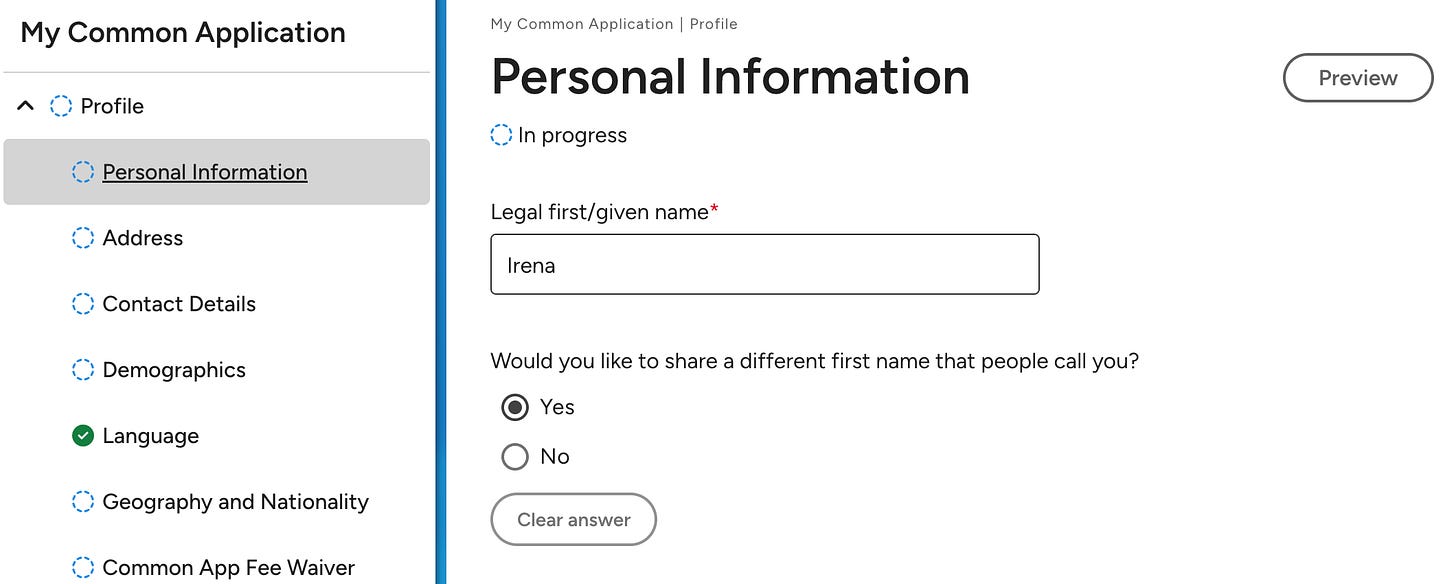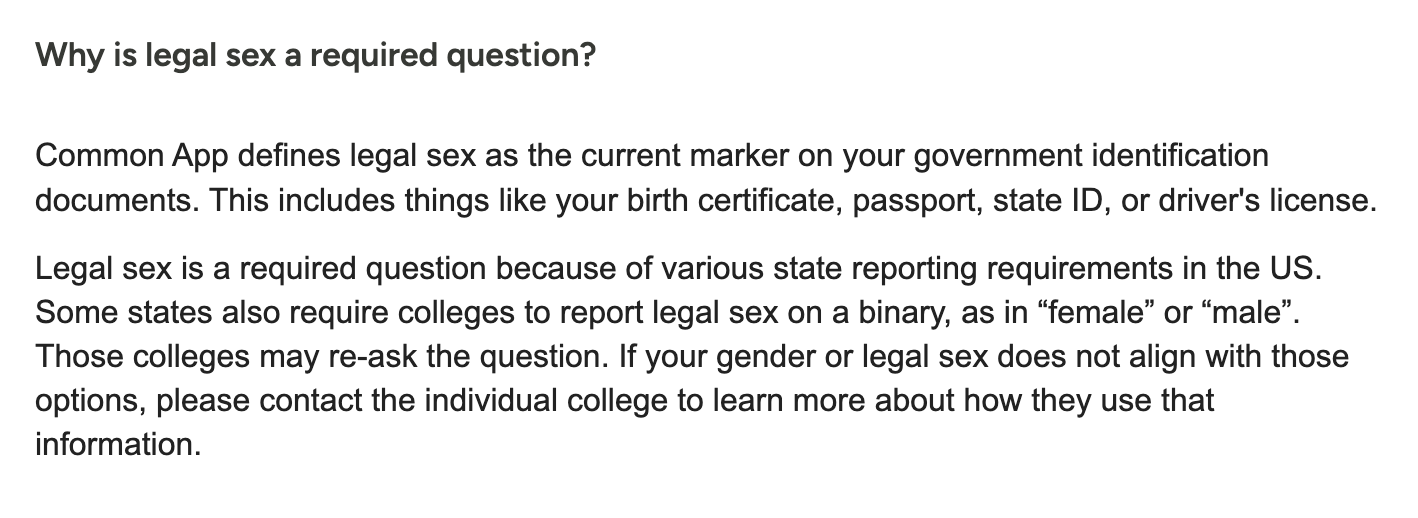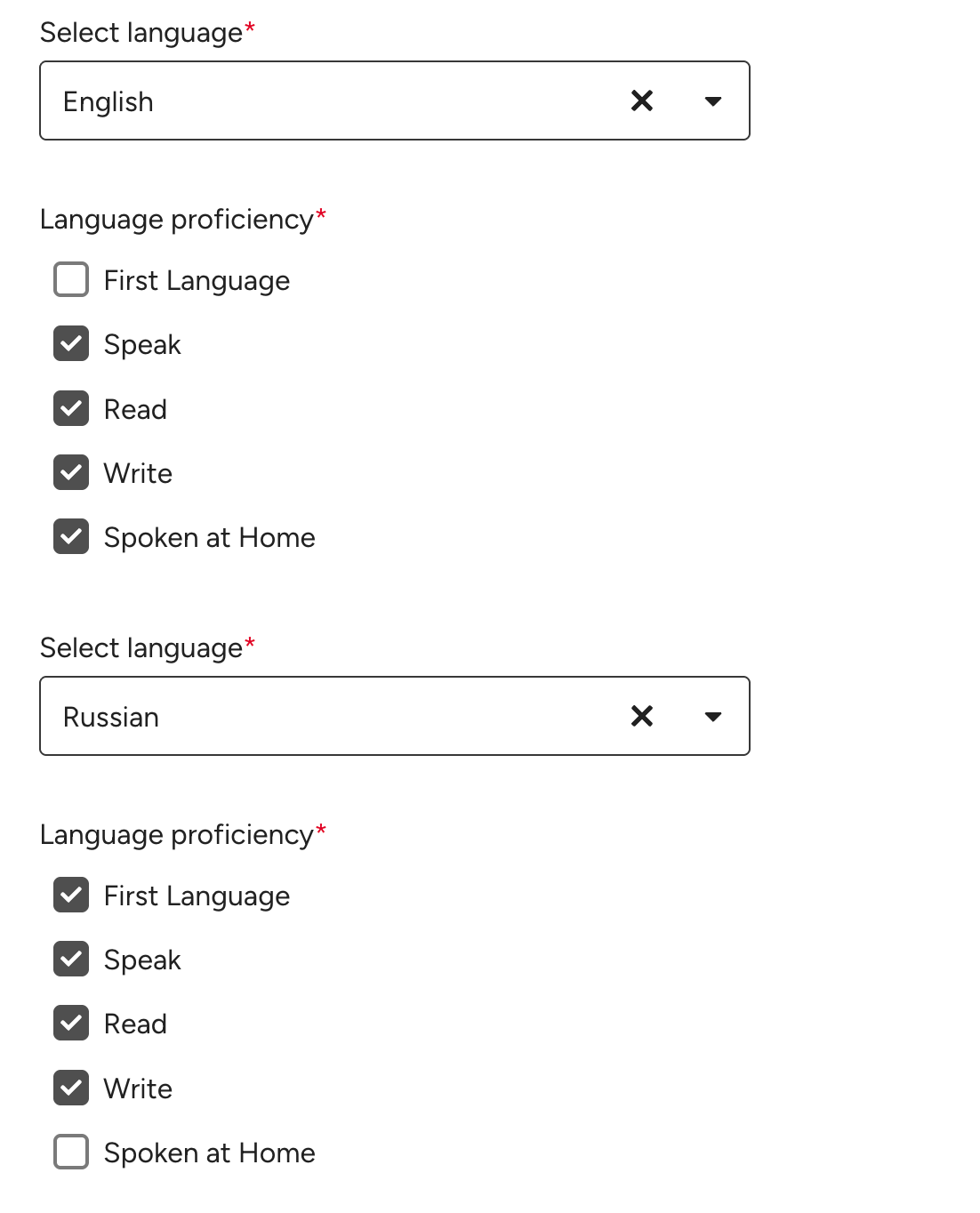In my last post, I suggested parents consider opening their own Common App account and filling it out, and today we’re actually going to do it, starting from the beginning like normal people and not from whatever catches our eye like I usually do because I have more in common with the dog in Pixar’s Up than I care to admit.
The Common App has six sections: Profile, Family, Education, Testing, Activities, and Writing. First up: the Profile section!
The Profile section asks for your Personal Information first, which seems overly ambitious for a sub-section that consists solely of your name and your birth date. It’s only later that it gets really personal. It asks for your demographics—your gender, your legal sex, your pronouns, your race and ethnicity. It asks about the language or languages you speak. It asks about where you were born and your citizenship and your residency status. It’s a lot.
Getting Started
I started completing the Personal Information section and immediately stopped at “legal first/given name” because I have a story about that. (Full disclosure: I have a story about almost everything, but this is a good one.) My legal first/given name is Ирина, transliterated in English as Irina and pronounced Ee-reena. But after my parents and I left Soviet Russia and arrived in the United States, my father summarily decreed that my American name would be Irene because Irene would be easier for Americans to pronounce than Irina.
My father spoke reasonably fluent English. I knew how to count from 1 to 10 and say “hello,” “goodbye,” and “thank you.” My father was an adult and I was a nine-year-old child. But the name Irene was not for me, and I knew this with a fierce certainty, and I told my father so. He responded with the Russian equivalent of “too bad, so sad.” I responded by waiting until he left the room, sneaking over to his desk, and changing the terminal “e” to an “a” with a ballpoint pen on our petition for permanent residency. My father shook his head when he discovered my mutiny but let it stand, probably because he didn’t want to deface an official document any more than it already had been defaced, and that was how I became Irena (pronounced Aye-reena).
You might have your own story—about shedding your given name, or reclaiming it. About a nickname you didn’t ask for but came to embrace, or hate. If you don’t already know, ask your parents how they decided on your name. Or, if they don’t already know, tell your child how you decided on their name. (I recently learned that my daughter is thinking about naming her hypothetical future children Jezebel or Bathsheba, and I’m not sure how to feel about that, but I still stand by my assertion that these are conversations worth having.)
Address
Where do you live? Why did you pick your house, or your condo, or your apartment? Along with the boxes and furniture, what hopes and dreams did you bring with you when you moved in?
Contact Details
Home or mobile phone number. No notes.
Demographics
The demographics section is fraught. There’s no other word for it. Or maybe there is, and the word is intrusive. In any case, the demographics section wants to know your gender and your legal sex and your pronouns and your race and ethnicity, although it doesn’t say race and ethnicity. Instead, it asks how you identify yourself and gives you six options (Hispanic/Latino, American Indian or Alaska Native, Asian, Black or African American, Native Hawaiian or Other Pacific Islander, and White, with multiple sub-categories under each option (for instance, under “Asian,” you can choose from Cambodia, China, India, Japan, Korea, Malaysia, Pakistan, Philippines, Vietnam, Other East Asia, Other South Asia, Other Southeast Asia. If you click “Other South Asia,” a text box appears, asking you to specify.
The gender/sex section is your first hint that this is not your grandparents’ college application, or even yours, unless you applied to college in 2021 or later, which is when the Common App added these questions to better support LGBTQ+ students.
If you click on “Learn more” after the “Legal Sex” heading, the Common App will take you to this response:
I think it’s safe to say that most of us came of age in a world when the information required to apply to college was a little less… granular. My parents left Soviet Russia in part because our Soviet passports had a space marked “Nationality,” and it was marked “Jewish” as opposed to “Russian,” even though both their families had lived in the Soviet Union (and before that, in Czarist Russia) for generations. The designation “Jewish” meant, among other things, that certain colleges and certain areas of study and certain jobs were closed off to them and would be to me, and so they chose to leave everything behind to come to a country where everyone was judged by their merit and not by their race or ethnicity or religion.
And yet. Last year I wrote about identity politics in college essays, about how students and families worried that their income, or their race, or ethnicity, or religion, or gender identity would be held against them. When I worked as a college counselor, parents asked me if their children should leave the race/ethnicity section blank, or else harken back to a great-uncle who was part whatever the putatively desired race or ethnicity was. It’s not exactly breaking news that we live in a country where everyone does not, in fact, have access to the same opportunities, and we are not all judged by the same yardstick. Now what?
Here’s my suggestion: if filling out this section causes anxiety, ask yourself why. Think about all your identities. About what was expected from girls or from boys when you were growing up. About the food you ate, the celebrations you went to, the clothes you wore. About what made you embarrassed and what made you proud.
Language
You must indicate at least one (and up to five) languages you’re proficient in. Here’s mine (I’m still on the fence whether I should add my incredibly rusty French and pretend I’m proficient):
No doubt you have your own stories, about being born to parents who spoke with your grandparents in a language you didn’t understand. About your resentment that your parents never taught you Gujarati, or Czech, or Mandarin, or Greek, and that you understand only snippets as a result. Or about your embarrassment that you never lost your accent. Or your regret that you never learned another language besides English, or about your diminishing fluency in your native tongue. (Whether you’re monolingual or a polyglot, I highly recommend Masha Rumer’s delightful book, Parenting with an Accent: How Immigrants Honor Their Heritage, Navigate Setbacks, and Chart New Paths for Their Children.)
Geography and Nationality
The country my parents and I were born in—the Union of Soviet Socialist Republics—is now called the Russian Federation. My parents and I lost our Soviet citizenship after we applied to emigrate, and until we received our green cards three years later, we were considered stateless. My father preferred to describe us, somewhat pretentiously, as “citizens of the world” and dragged his feet on applying for American citizenship, which was well and good until I got kicked out of a school trip to Europe in 10th grade, in part because I was stateless and in possession of improper paperwork (more about that in my memoir, and also in my college application essays—even then, I knew I had narrative gold on my hands).
The Geography and Nationality section wants to know where you were born, and whether you’re a US citizen or a foreign national or a permanent resident, but aren’t we all impermanent residents on this earth? Aren’t we all immigrants in one way or another—from other countries, from other cultures, from our own childhoods, from the past? And aren’t we more similar than different, especially if—like all parents everywhere—we want our children to be safe, happy, successful?
The problem is, you can’t make anyone happy or successful. But you can get to know yourself, which may give your children just enough space to figure themselves out.
Next up: the Family section!
Updates:
Our next Curmudgeon Chat (a live virtual meeting) is coming up on Sunday, Sept. 21 at 9 am Pacifc! The topic is “A Life of Our Own,” and we will focus on the how curating your own extracurricular activities can help you and your children. The Curmudgeon Chats are open to paid subscribers, and not to upsell you or anything, but a paid subscription is cheaper than therapy, and DEFINITELY cheaper than college counseling. I hope to see you on Sept. 21!







I have nothing to in particular to say, but you should know I was too distracted and busy when the email came through, so I purposely flagged it and marked it as unread so I wouldn't forget, saving it for a quiet pocket of time. It was worth the wait. And anyone looking for a good book, I recommend The Names.